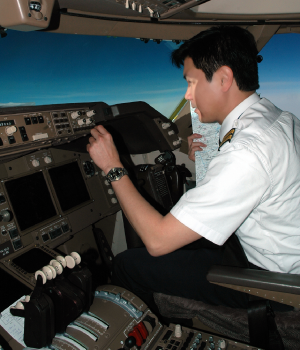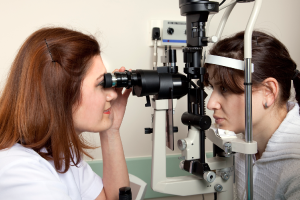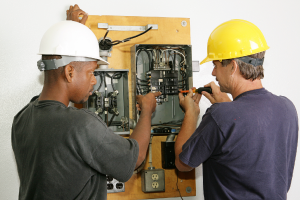|
Many students have asked why they should learn physics, because they think that physics is no help for their future life or career. They couldn’t be more wrong! The science of physics has applications that are at the core of many jobs and careers. 
|
 A pilot needs to understand physics to fly an aircraft. Position, velocity, and acceleration are fundamental physical quantities that a pilot must calculate and understand—from planning the flight to compensating for crosswinds. The airplane encounters forces in flight from lift and air resistance (or friction), which depend on the shape and orientation of the wings and the plane’s altitude. The jet engine is a compound machine that effectively transforms chemical energy from the fuel into the kinetic energy of motion. Related careers include ground repairmen, air traffic controllers, and military pilots of unmanned drones.
A pilot needs to understand physics to fly an aircraft. Position, velocity, and acceleration are fundamental physical quantities that a pilot must calculate and understand—from planning the flight to compensating for crosswinds. The airplane encounters forces in flight from lift and air resistance (or friction), which depend on the shape and orientation of the wings and the plane’s altitude. The jet engine is a compound machine that effectively transforms chemical energy from the fuel into the kinetic energy of motion. Related careers include ground repairmen, air traffic controllers, and military pilots of unmanned drones. 
|
 Understanding physics helps an optometrist perform an eye exam on a patient. The physics of light and optics (or lenses) is fundamental to understanding how the eye sees, the medical instruments used to test eyesight, and the lenses used to correct vision problems such as near- and far-sightedness. A healthy human eye acts as a lens of variable magnification and aperture size. In the back of the eye are light detectors called rods and cones, which sense both the intensity of light and its color. While optometrists need specialized medical training to do their work, they must first learn the physics of light!
Understanding physics helps an optometrist perform an eye exam on a patient. The physics of light and optics (or lenses) is fundamental to understanding how the eye sees, the medical instruments used to test eyesight, and the lenses used to correct vision problems such as near- and far-sightedness. A healthy human eye acts as a lens of variable magnification and aperture size. In the back of the eye are light detectors called rods and cones, which sense both the intensity of light and its color. While optometrists need specialized medical training to do their work, they must first learn the physics of light! 
|
 Electricians need to understand physics to wire a house. The electrical wiring of a house is a circuit that has a voltage across it (120 volts) and carries current through it (measured in amperes). Electricians must be able to read a circuit diagram, understand its symbols, and use it to wire an electrical circuit. They must understand the difference between series and parallel circuits, and between direct and alternating current, and know how to calculate power requirements to install appropriate circuit breakers and fuses. These days, electricians may also need to understand electronic controllers and printed circuit boards.
Electricians need to understand physics to wire a house. The electrical wiring of a house is a circuit that has a voltage across it (120 volts) and carries current through it (measured in amperes). Electricians must be able to read a circuit diagram, understand its symbols, and use it to wire an electrical circuit. They must understand the difference between series and parallel circuits, and between direct and alternating current, and know how to calculate power requirements to install appropriate circuit breakers and fuses. These days, electricians may also need to understand electronic controllers and printed circuit boards. 
|
How can you find out more about how a profession is connected to physics? Do research on the Internet or find a book in the library. The best way, however, is to find people who currently practice in that field, such as licensed electricians. Ask them what they need to know about physics and electricity to do their job! 
 |
What kinds of career opportunities, for example, might be available that relate to laser cutting machines? A mechanical engineer might design a product using CAD (computer-aided design) software. The engineer would then separate the product into a number of individual parts that need to be manufactured and then construct a layout of the individual cuts, in order, that the machine will make. An machine operator enters the commands into the machine's controls and operates the machine. When the part is finished being cut, a machinist smoothes any sharp edges of the part, folds the sheet metal at appropriate places, inserts small parts (such as screws or pins), and welds seams where parts join together. The machinist may be the same person who operates the laser cutting machine, particularly if the machine is automated! The machine's manufacturer might employ a specialist who periodically visits the factory to do maintenance on the machine. Other workers might assemble and test the product before shipping it to a customer. There are many related to making one part or product; each job requires a different type of job training or technical skills. 
|
| |
|

